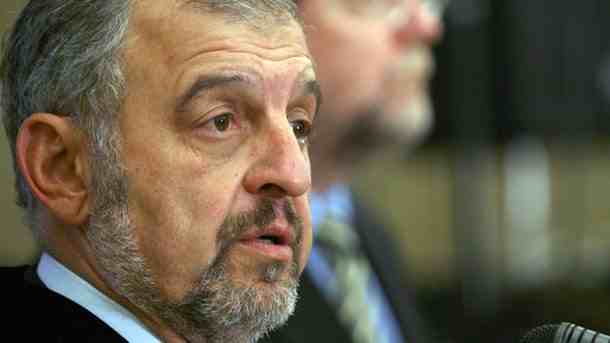Anhialo (now Pomorie)
Anastasia Balezdrova
A month ago GRReporter published an interview with Greek historian and professor at the Aristotle University of Thessaloniki Iakovos Michailidis on the camp in Trikeri. In Bulgaria, the major explorer of the historical period when these developments took place is rector of Sofia University "St. Kliment Ohridski" Prof. Ivan Ilchev. In his interview with GRReporter, he speaks not only about the events in Trikeri but also presents the overall picture of the Bulgarian-Greek relations in the early 20th century.
 Professor Ivan Ilchev became Professor in Modern and Contemporary History of the Balkan Peoples in 1995, Dean of the Faculty of History in 2003 and he was elected Rector of Sofia University "St. Kliment Ohridski" in 2007. He was a guest-professor at several American universities and the University of Chiba in Japan. Professor Ilchev has written 13 monographs, 67 scientific articles and papers, 40 book reviews, more than 150 scientific and popular articles and scenarios of 17 popular science films.
Professor Ivan Ilchev became Professor in Modern and Contemporary History of the Balkan Peoples in 1995, Dean of the Faculty of History in 2003 and he was elected Rector of Sofia University "St. Kliment Ohridski" in 2007. He was a guest-professor at several American universities and the University of Chiba in Japan. Professor Ilchev has written 13 monographs, 67 scientific articles and papers, 40 book reviews, more than 150 scientific and popular articles and scenarios of 17 popular science films.
Mr. Ilchev, what was the fate of the Bulgarian populations in Greece in the period from the disintegration of the Ottoman Empire until the end of World War I?
The Bulgarian populations fell within the Kingdom of Greece following the signing of the peace Treaty of Bucharest. At that time, the Kingdom of Greece included the areas around Kostur, Lerin, Ber, Voden (now Edessa) and parts of the Thessaloniki area that were populated mainly by Bulgarians. Unfortunately, the politics that the Greek government pursued was not significantly different from the politics followed by the majority of the Balkan governments. The Greek troops captured the Bulgarian churches even upon entering this territory and the priests had to recognize the authority of the Patriarchate. Those who disagreed were removed from their posts and they emigrated. The Bulgarian liturgical books were burnt. The Bulgarian church trustees were disbanded and the Bulgarian schools were closed down. Actually, there was an immediate ban on teaching in Bulgarian. This caused the beginning of a wave of refugees, which did not abate for decades.
At the same time, the Greek immigrants arriving from the lands of Ottoman Turkey began to settle in these lands and the process continued during World War I. Greece was not involved in the war for three years. It was one of the last countries that intervened in it in 1917, when the government of Northern Greece, headed by Elefterios Venizelos and supported by the Entente, took power in the country.
Venizelos was one of the few Balkan political leaders who had a vision for the future. During the talks on the Balkan Union in 1911-1912, he insisted on predefining the future border between Bulgaria and Greece. He suggested that the border would pass along the lakes that are north of Thessaloniki. The Bulgarian delegates objected that this border would leave numerous Bulgarian populations in the area of Kostur, in Voden, under Greek rule. He replied that there would be many Bulgarians in the area but Bulgaria would add to its territory Eastern and Western Thrace
that was the home to numerous Greek populations. According to him, a gradual exchange of populations between the two countries could clear the process. His motives were not so altruistic. He actually wanted to have an ally or at least a neutral country behind him in a subsequent conflict with Turkey on the fate of Western Anatolia and Istanbul.
The disagreement with such a border on the part of the Bulgarian negotiators initiated the negotiations between Serbia and Greece that led to an alliance against Bulgaria. Therefore, to a considerable extent, Bulgaria itself is to blame for what happened in those years.
We can talk about two periods after World War I until 1923. The first period is from the end of the war to 1922, when the peace Treaty of Sevres gave Eastern Thrace to Greece, Western Thrace was temporarily under French control at first but actually, all knew that it would join Greece to provide the necessary corridor to Eastern Thrace and so it happened. Then the process that had started even during the Balkan wars spread to Western Thrace where the transfer of endless caravans of refugees from there to Bulgaria began.
Turks had already taken care of Eastern Thrace as early as 1913 when, within three months, they had chased away all Bulgarian and Greek populations from the area and it had become Turkish in terms of population.
In Eastern Thrace, the population was divided roughly into three groups before the Balkan war, namely 1/3 Bulgarians, 1/3 Greeks, 1/3 Turks. After the defeat of Bulgaria in the Second Balkan War, when Turkey seized eastern Thrace again, it did not make a substantial difference between Bulgarians and Greeks - it chased away the two ethnic groups and therefore, not more than 1,500 Bulgarians remained in Eastern Thrace a year after the end of the Second Balkan War.